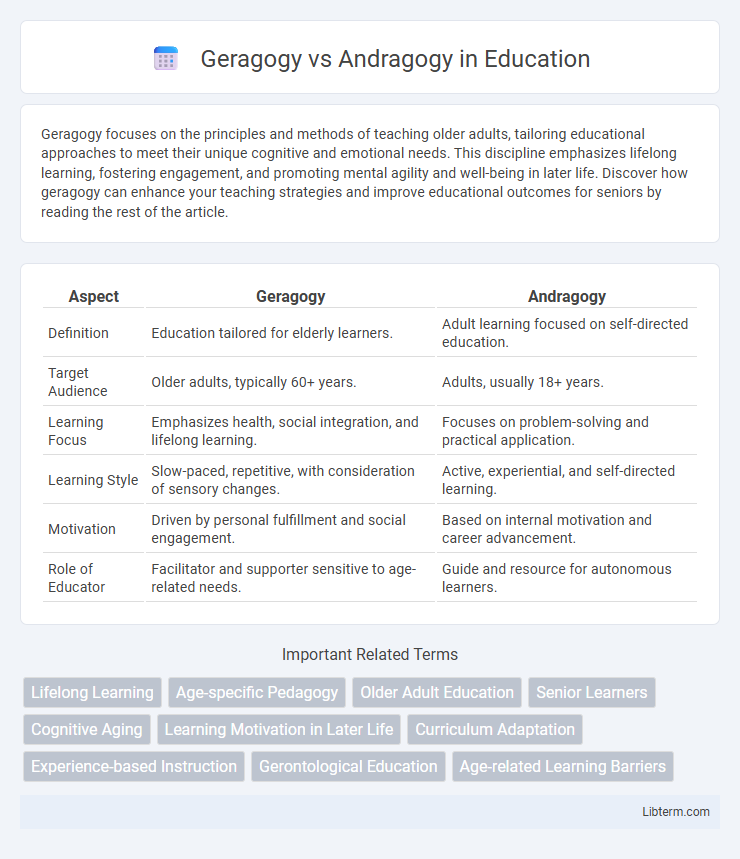Geragogy focuses on the principles and methods of teaching older adults, tailoring educational approaches to meet their unique cognitive and emotional needs. This discipline emphasizes lifelong learning, fostering engagement, and promoting mental agility and well-being in later life. Discover how geragogy can enhance your teaching strategies and improve educational outcomes for seniors by reading the rest of the article.
Table of Comparison
| Aspect | Geragogy | Andragogy |
|---|---|---|
| Definition | Education tailored for elderly learners. | Adult learning focused on self-directed education. |
| Target Audience | Older adults, typically 60+ years. | Adults, usually 18+ years. |
| Learning Focus | Emphasizes health, social integration, and lifelong learning. | Focuses on problem-solving and practical application. |
| Learning Style | Slow-paced, repetitive, with consideration of sensory changes. | Active, experiential, and self-directed learning. |
| Motivation | Driven by personal fulfillment and social engagement. | Based on internal motivation and career advancement. |
| Role of Educator | Facilitator and supporter sensitive to age-related needs. | Guide and resource for autonomous learners. |
Understanding Geragogy and Andragogy: Key Definitions
Geragogy refers to the methods and principles of teaching older adults, emphasizing their unique cognitive, emotional, and social learning needs, while andragogy focuses on the education of adults, highlighting self-directed learning and practical application of knowledge. Key definitions identify geragogy as an extension of adult education tailored to the elderly, and andragogy as a foundational theory for adult learning, popularized by Malcolm Knowles. Understanding these distinctions enables educators to create effective, age-appropriate learning experiences that enhance engagement and knowledge retention in diverse adult learners.
Historical Evolution of Adult Learning Theories
Geragogy and andragogy represent two distinct approaches to adult learning, with their historical evolution rooted in the shifting understanding of adult education needs. Andragogy, popularized by Malcolm Knowles in the 20th century, emphasizes self-directed learning and the learner's experience, contrasting with child-centered pedagogy. Geragogy, emerging later, focuses specifically on learning processes and challenges faced by older adults, incorporating aspects of cognitive decline and social changes influencing lifelong learning.
Core Principles of Andragogy
Andragogy centers on the principle that adult learners are self-directed, bringing prior experiences that enrich the learning process and prefer practical, problem-solving approaches. It emphasizes intrinsic motivation, readiness to learn driven by real-life tasks, and the need for learning to be relevant to personal and professional growth. These core principles contrast with geragogy, which adapts educational methods to the cognitive and physical changes in older adults, focusing on accommodating age-related challenges.
Essential Concepts of Geragogy
Geragogy centers on the unique learning needs of older adults, emphasizing the importance of cognitive changes, life experience, and social context in educational design. Essential concepts include accommodating slower information processing, promoting self-directed learning, and integrating practical, real-life applications that enhance motivation and retention. This approach recognizes the diversity of aging learners and fosters inclusive, respectful environments tailored to their developmental stages.
Differences Between Geragogy and Andragogy
Geragogy focuses on teaching strategies tailored for older adults, emphasizing cognitive decline, age-related sensory changes, and life experience integration, while andragogy centers on adult learning principles, stressing self-directed learning, prior knowledge, and practical application. Geragogy addresses challenges like memory retention and motivation in elderly learners, whereas andragogy prioritizes autonomy and problem-solving skills in middle-aged and younger adults. The key difference lies in geragogy's adaption to aging processes versus andragogy's broader framework for adult education without specific consideration of aging effects.
Cognitive, Social, and Emotional Needs: Older vs. Younger Adults
Geragogy emphasizes cognitive approaches tailored to older adults, focusing on memory retention and slower information processing compared to andragogy, which addresses the faster learning pace of younger adults. Socially, geragogy promotes learning environments that reduce isolation and enhance community engagement, while andragogy leverages peer interactions and collaborative learning suited to younger cohorts. Emotionally, geragogy supports learning through validation of life experiences and encouragement of self-worth, contrasting with andragogy's focus on motivation driven by career goals and personal development.
Teaching Methods in Geragogy
Teaching methods in geragogy emphasize personalized, experiential learning tailored to older adults' cognitive and physical abilities, incorporating strategies such as storytelling, collaborative problem-solving, and multisensory engagement. Geragogical approaches prioritize slower pacing, repetition, and practical application to enhance memory retention and motivation among elderly learners. Unlike andragogy, which centers on self-directed learning for adults, geragogy integrates emotional support and intergenerational activities to foster social connections and lifelong learning.
Instructional Strategies in Andragogy
Instructional strategies in andragogy emphasize self-directed learning, where adults actively participate in identifying their learning needs and setting goals. Techniques such as problem-based learning, experiential activities, and collaborative projects harness adult learners' prior knowledge and real-world experiences. These strategies foster critical thinking, practical application, and intrinsic motivation, differentiating andragogical approaches from traditional pedagogical methods.
Practical Applications: Case Studies and Examples
Geragogy, focusing on educational methods tailored to older adults, utilizes case studies such as senior community learning programs emphasizing cognitive stimulation and social engagement. In contrast, andragogy applies principles of self-directed learning and experiential techniques in workplace training, evident in cases where adult learners design personalized skill development plans. Practical applications highlight geragogy's role in promoting lifelong learning through age-specific strategies, while andragogy supports professional growth by leveraging adults' prior experiences and intrinsic motivation.
Future Trends in Adult and Older Adult Education
Geragogy and andragogy both shape future trends in adult and older adult education by emphasizing learner-centered approaches tailored to cognitive and experiential differences. Emerging technologies like AI-driven personalized learning platforms and virtual reality are transforming the educational landscape, enhancing engagement and accessibility for diverse aging populations. Increasing focus on lifelong learning and intergenerational knowledge exchange further supports cognitive health and social inclusion in geragogy and andragogy frameworks.
Geragogy Infographic

 libterm.com
libterm.com